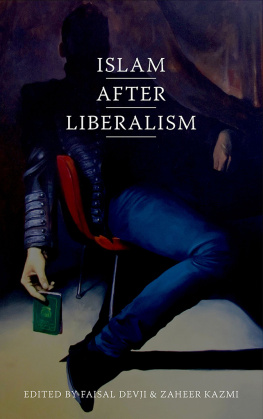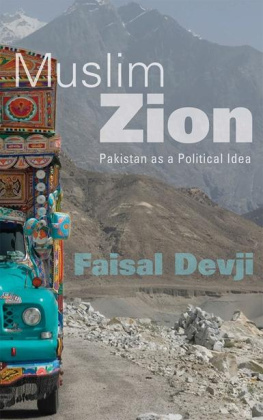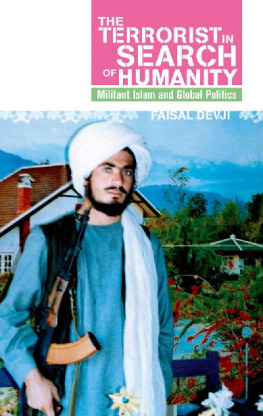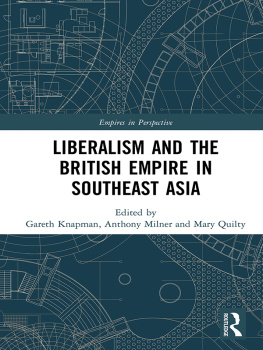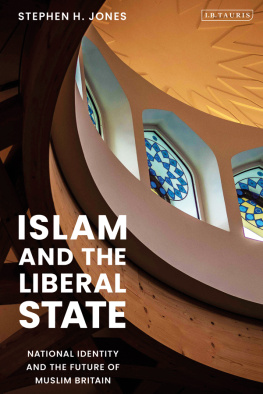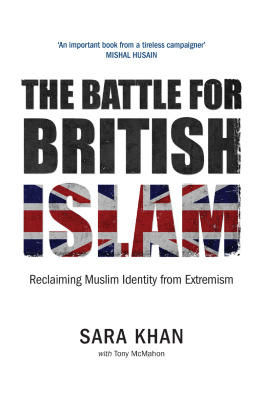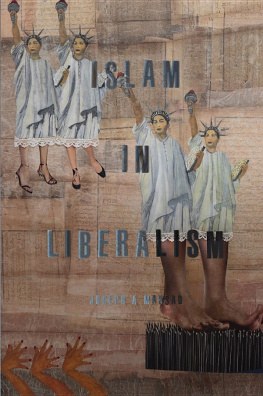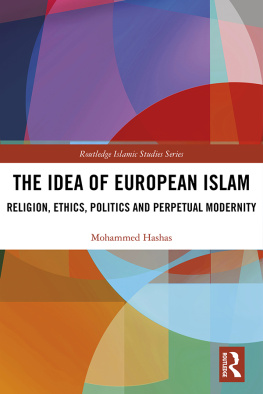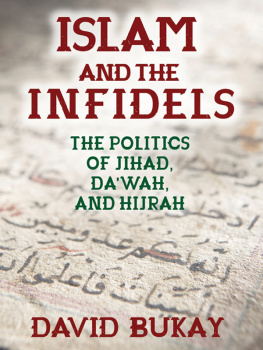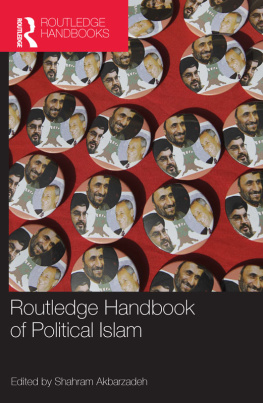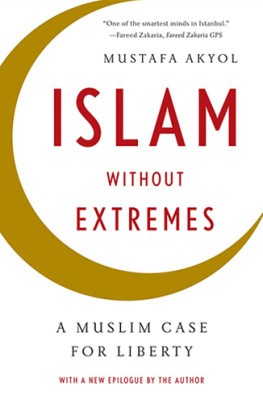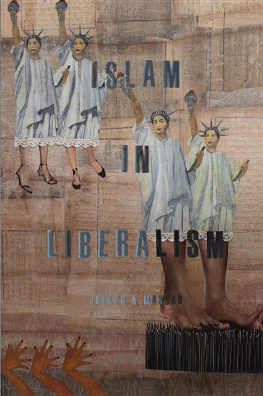ISLAM AFTER LIBERALISM
FAISAL DEVJI
ZAHEER KAZMI (Editors)
Islam After Liberalism


Oxford University Press is a department of the University of Oxford. It furthers the Universitys objective of excellence in research, scholarship, and education by publishing worldwide.
Oxford New York Auckland Cape Town Dar es Salaam Hong Kong Karachi Kuala Lumpur Madrid Melbourne Mexico City Nairobi New Delhi Shanghai Taipei Toronto
With offices in Argentina Austria Brazil Chile Czech Republic France Greece Guatemala Hungary Italy Japan Poland Portugal Singapore South Korea Switzerland Thailand Turkey Ukraine Vietnam
Oxford is a registered trade mark of Oxford University Press in the UK and certain other countries.
Published in the United States of America by
Oxford University Press
198 Madison Avenue, New York, NY 10016
Copyright Faisal Devji, Zaheer Kazmi and the Contributors, 2017
All rights reserved. No part of this publication may be reproduced, stored in a retrieval system, or transmitted, in any form or by any means, without the prior permission in writing of Oxford University Press,or as expressly permitted by law, by license, or under terms agreed with the appropriate reproduction rights organization. Inquiries concerning reproduction outside the scope of the above should be sent to the Rights Department, Oxford University Press, at the address above.
You must not circulate this work in any other form and you must impose this same condition on any acquirer.
Library of Congress Cataloging-in-Publication Data is available
Faisal Devji, Zaheer Kazmi.
Islam After Liberalism
ISBN: 9780190851279
CONTENTS
Faisal Devji and Zaheer Kazmi
Hussein Omar
Nadia Bou Ali
Faisal Devji
Neguin Yavari
Abdennour Bidar
Armando Salvatore
Zaheer Kazmi
Arshin Adib-Moghaddam
. Militancy, Monarchy and the
Struggle to Desacralise Kingship in Arabia
Ahmed Dailami
Michael Muhammad Knight
Sadia Abbas
Edward E. Curtis IV
Peter Mandaville
This book has its origins in the Beyond Muslim Liberalism workshop held at St Antonys College, Oxford in March 2014. In addition to our chapter writers, we would like to thank the following workshop participants who gave papers not included in this volume, or acted as discussants and session chairs: Madawi Al-Rasheed, Mohammed Bamyeh, Alastair Crooke, Michael Freeden, Kevin Fogg, and Nilufer Gole. The workshop was supported by the Economic and Social Research Council (ES/J003115/1) and hosted by the Asian Studies Centre at St Antonys College, Oxford.
Faisal Devji and Zaheer Kazmi
Sadia Abbas is Associate Professor, Department of English, Rutgers University.
Arshin Adib-Moghaddam is Professor in Global Thought and Comparative Philosophies, Department of Politics and International Studies, SOAS, University of London.
Nadia Bou Ali is Assistant Professor, Civilization Studies Program, American University of Beirut.
Abdennour Bidar is a writer, philosopher and associated researcher at the cole Pratique des Hautes tudes (EPHE), Paris.
Edward E. Curtis IV is Millennium Chair of the Liberal Arts and Professor of Religious Studies, Indiana UniversityPurdue University Indianapolis (IUPUI).
Ahmed Dailami works on the intellectual history and contemporary politics of the Middle East with a particular focus on the Arabian Peninsula. He holds a D. Phil in Oriental Studies from the University of Oxford.
Faisal Devji is Reader in Modern South Asian History and Fellow of St Antonys College at the University of Oxford.
Zaheer Kazmi is a Senior Research Fellow at the Mitchell Institute for Global Peace, Security and Justice, Queens University Belfast.
Carool Kersten is Reader in the Study of Islam and the Muslim World, Department of Theology and Religious Studies, Kings College London.
Michael Muhammad Knight is a writer, novelist and Assistant Professor, Department of Philosophy, University of Central Florida.
Peter Mandaville is Professor of International Affairs in the Schar School of Policy and Government at George Mason University.
Hussein Omar is AHRC Postdoctoral Fellow in the Faculty of History and Pembroke College, University of Oxford.
Armando Salvatore is Barbara and Patrick Keenan Chair in Interfaith Studies and Professor of Global Religious Studies, School of Religious Studies, McGill University.
Neguin Yavari is a Senior Research Fellow at the Kolleg-Forschergruppe Multiple Secularities, Universitt Leipzig.
Faisal Devji and Zaheer Kazmi
The relationship between Islam and liberalism has been a subject of scholarly as much as popular debate for at least a century and a half. Its progress sometimes hailed and at other times found wanting, this relationship has been marked by the unchanging and even stereotypical terms in which it has been debated, including issues such as the separation of church and state, the status of women and the rights of non-Muslims. Each of these issues serves as a litmus test to measure the liberalism of Muslim individuals as well as societies, and each is also drawn from the real or imagined history of liberalism in Europe. However, as a historical and variable phenomenon, liberalism does not in fact possess a normative definition but constitutes a family of shifting and overlapping ideas having to do with the freedoms of property and contract, speech and movement, or of rights and representation.
The freedoms that have come to define liberalism differ in time and place, so that among its Muslim supporters as much as enemies, for instance, private property and contract law have rarely been controversial (though they might be for those Muslims who identify as socialists). Moreover, the categories Islam and liberalism are not in fact so distinct from one another, and it is even possible to argue that proponents of the latter have always relied upon the formers recalcitrance, against which its own progress is to be defined. As the property of its adherents, it could now be seen as an identity that, whether it had to be opposed or protected, might only be conceptualised in liberal terms as an interest.
In its earliest form, the relationship between Islam and liberalism was defined by imperial politics. Already in the 1930s, the influential Indian philosopher and poet Muhammad Iqbal noted how the questions that were of interest to his colonised Muslim compatriots, as well as to their British rulers, had to do with the formers loyalty to Islamic authorities outside India, their views on jihad or messianism, and the interpretation of certain verses from scripture. Such questions, therefore, which have again become familiar in our own day, first came to define the relationship between Islam and liberalism in the nineteenth century:

